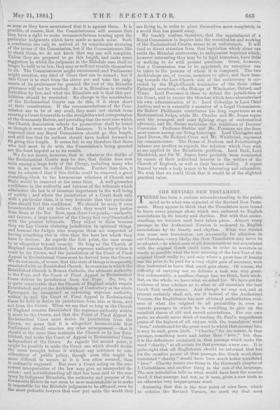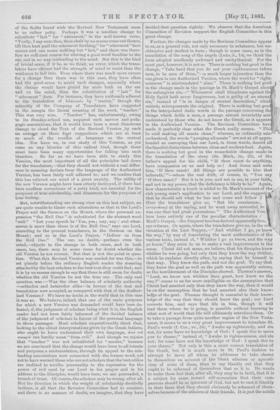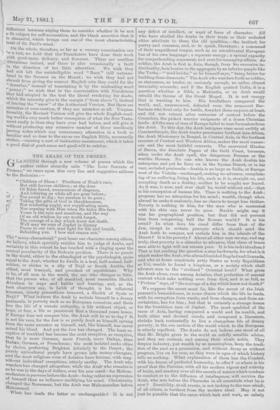THE REVISED NEW TESTAMENT.
THERE has been a curious misunderstanding in the public mind as to what was expected of the Revised New Testa- ment. Many appear to think that the Translators were bound to leave every passage alone which was endeared to English associations by its beauty and rhythm. But with that under- standing, no revision need have takeu place. Almost every • passage in the Authorised Version is endeared to English associations by its beauty and rhythm. What was wanted was some new translation, not necessarily for adoption in our Churches,—very likely, the New Translation may never be so adopted,—to which men of all denominations not acquainted with the original Greek could turn, in order to ascertain as nearly aS possible what the true meaning of the best Text of the original Greek really is; and only where a great loss of beauty was the price to be paid for a very slight gain of accuracy, were they instructed to leave that small gain alone. Of course, the difficulty of carrying out so delicate a task was very great. Not unfrequently, a needless change has, we think, been made. But, on the whole, we have what we asked for. We have got the evidence of true scholars as to what in all essentials the best Greek Text really means. And though we may not, and at present certainly shall not, use it instead of the Authorised Version, the Englishman has now obtained authoritative evid- ence of what the original in all probability is, even as regards passages in which he is unwilling to give up the manifold charm of old and sacred associations. For our own parts, we should never think of reaching St. Paul's magnificent praise of the highest of all virtues with the translators' word "love," substituted for the great word to which that passage has, it may be said, given birth. " Charity," for us, means, in that passage, something more and better than " love ;" but then it is the definitions contained in that passage which make the word " charity," at all events for that passage, a new one. It is quite right that all Englishmen should be informed that but for the creative power of that passage, the Greek word there translated " charity " would have been much better translated " love." Charity means one thing in the thirteenth chapter of I. Corinthians, and another thing in the rest of the language. The new translation tells us what would have been the nearest word, if that passage had not, as it were, given a new birth to an otherwise very inappropriate word.
Assuming that this is the true point of view from which to criticise the Revised Version, we must say that most
of the faults found with the Revised New Testament seem to us rather petty. Perhaps it was a needless change to substitute " last " for "uttermost," in the well-known verse, "Verily, I say unto thee, thou shalt by no means come out thence, till thou hest paid the uttermost farthing," for " uttermost" here means and can mean nothing but "last," and there was there- fore no sufficient reason for altering a good word familiar to the ear, and in no way misleading to the mind. But this is the kind of trivial error, if it be, as we think, an error, which the trans- lators have oftener had the strength of mind to resist than the weakness to fall into. Even where there was much more excuse for a change than there was in this case, they have often had the good-sense to avoid such changes, especially where the change would have grated far more both on the ear and on the mind, than the substitution of " last " for " uttermost " does. For instance, they have uniformly adhered to the translation of Wciameal by " master," though the minority of the Company of Translators have suggested in the margin the literal meaning of the word, " teacher." This was very wise. " Teacher " has, unfortunately, owing to its Sunday-school use, acquired such narrow and peda- gogic associations, that it would have been a most disastrous change to cloud the Text of the Revised Version by such an outrage on those finer suggestions which are at least as much of the essence of language as the central idea. Nor have we, in our study of this Version, as yet come on any blunder of this radical kind, though there must have been many opportunities for falling into such blunders. So far as we have been able to study this Version, the most important of all the principles ]aid down for the translators,—that they should not without a real differ- ence in meaning deviate from the language of the Authorised Version, has been fairly well adhered to ; and we confess that this has relieved our mind of a great anxiety. The utility of the new Version might have been utterly destroyed, if there had been needless corrections of a petty kind; not essential for the purposes of true scholarship, and disastrous for the purposes of true fooling.
But, notwithstanding our strong view on this last subject, we are quite unable to blame such alterations as that in the Lord's Prayer and the Sermon on the Mount, where the personal ex- pression "the Evil One" is substituted for the abstract word "evil." "Let your speech be 'Yea, yea; nay, nay :' and what- soever is more than these is of the Evil One," says our Lord, according to the present translators, in the Sermon on the Mount; and so in the Lord's Prayer, "Deliver us from the Evil Ono." The car, no doubt,—perhaps even the mind,—objects to the change in both cases, and in both oases, too, there may be some room for doubt whether the old Version be not correct. • But that is not the point in ques- tion. What this Revised Version was needed for was this,—to set plainly before the ordinary English reader the meaning attached by the best scholars to the best text they could find; and it is by no means enough to say that there is still room for doubt whether the old Version be not the true one. The only real question was :—Was the clear balance of scholarly authority —orthodox and heterodox alike—in favour of the text and translation now accepted, as compared with that of the Author- ised Version P We have no doubt in the world that in this case it was so. We believe, indeed, that one of the main purposes for which a new Version was demanded would have been de- feated, if, the judgment of scholars being what it is, the English reader had not been fairly informed of the decided balance of the judgment of scholars in favour of the personal language in these passages. Most scholars unquestionably think that, looking to the oldest interpretations given by the Greek fathers, who ought to have understood their own language, eilra rop rOline0D can hardly mean "from evil." And though we rejoice that "teacher " was not substituted for " master," because we are convinced that the change would have been to all intents and purposes a mistranslation, through its appeal to the mis- leading associations now connected with the former word, yet not to have warned those who are not scholars that the best critics are inclined to ascribe personality to the expression for the power of 'evil used by our Lord in his prayer and in his address to the Disciples, would have been, we are persuaded, a breach of trust. Of course, the scholars may be wrong, after all. But the direction in which the weight of scholarship decidedly inclines, is all that the Revision Committee had to consider, and there is no manner of doubt, we imagine, that they have
decided that question rightly. We observe that the American Committee of Revision support the English Committee in this great change.
Further, the changes made by the Revision Committee appear to us, as a general rule, not only necessary in substance, but un- obtrusive and modest in form ; though in some cases, as in the translation of the song of the angels (Luke, ii., 14), we think the form adopted needlessly awkward and unrhythmical. For the most part, however, it is not so. There is nothing but good in the change, "Take heed that you do not your righteousness before men, to be seen of them,"—a much larger injunction than the one given in our Authorised Version, where the word for "right- eousness " is mistranslated. " alms." There is nothing but good. in the change made in the passage in St. Mark's Gospel abou the unforgiven. sin,—" Whosoever shall blaspheme against th Holy Spirit hath never forgiveness, but is guilty of an etern sin," instead of " is in danger of eternal damnation," whic entirely misrepresents the original. There is nothing but goo in the interpolated italic words in the passage concerning th things which defile a man, a passage almost invariably mis understood by those who do not know the Greek, as it appear
in the Authorise(' Version. The Revision Committee hav made it perfectly clear what the Greek really means. " Thi he said making all meats clean," whereas, as ordinarily mis- j;r
understood, the words " purging all meats " are not at all appre- hended as conveying that our Lord, in these words, denied all the fanciful distinctions between clean and unclean food. Again, there is nothing but good in the remarkable change made in the translation of the story (St. Mark, ix., 23), of the father's appeal for his child, " If thou canst do anything,
have compassion on us and help us! And Jesus said unto him, If thou canst All things are possible to him that believeth,' "—where the real drift, of course, is, "You say If thou canst !' But it is in you, and not in me, in your faith, and not in my power, that the deficiency is likely to be." Again, how characteristic a touch is added to St. Mark's account of the rich young man's application to our Lord, and the suggest.; that he should sell what ho has and come and follow J Here the translators give us, " But his countenane'... (orvrwictag) at the saying, and he wont away sorrowful, fo: was one that had great possessions." The Authorised Yen here loses entirely one of the peculiar characteristics c' Mark's Gospel,—the frequent touches derived apparently fro', eye-witness. Or again, where the translators give us, in the co versation at the Last Supper,—" And whither I go, ye know
the way," by way of translating the most authoritative of the various texts, instead of, " Whither I go ye know, and the way ye know," they seem to us to make a vast improvement in the sense. Christ did not mean, we believe, that his disciples knew whither he was going, but only that they knew the way thither, which he explains directly after, by saying that he himself is that way. They knew the path, and not the goal. To say that they knew the goal as well as the path was apparently untrue, as the bewilderment of the Disciples showed. Thomas's answer, " Lord, we know not whither thou goest, how know we the way P" seems to us far more intelligible on the assumption that Christ had asserted only that they knew the way, than it would be on the assumption that he had asserted also their know- ledge of the goal. Thomas thought it essential to their know- lodge of the way that they should know the goal ; our Lord corrects him, and says that life in him, though it will lead them where he is going, is possible without knowing to what sort of world that life will ultimately introduce them. Or to take a passage from quite another region of the New Testa- ment, it seems to us a very great improvement to translate St. Paul's words (I. Col.., xv., 34), " Awake up righteously, and sin not, for some have no knowledge of God ; I speak this to move you to shame ;" instead of, " Awake to righteousness, and sin not; for some have not the knowledge of God : 1 speak this to your shame." Not only is this a more correct translation of the Greek, but it is much more in St. Paul's fashion to attempt to move all whom ho addresses to take shame
to themselves on account of the blank atheism or agnosti- cism of some of them, than to say blankly out that they ought to be ashamed of themselves that so it is. Ile wants to make them feel that, after all, they may be in fault, that it is a subject for some inward self-accusation that their com- panions should be so ignorant of God, but not to cast it blankly in their faces that they should obviously be ashamed of them- selves because of the atheism of their friends. It is just the subtle difference between urging them to consider whether it be not a fit subject for self-accusation, and the blank assertion that it is shameful, which brings out one of the most characteristic, trait of St. Paul's mind.
On the whole, therefore, so far as a cursory examination can be a test, we hold that the Translators have done their work with good-taste, delicacy, and firmness. There are needless alterations indeed, and there is also occasionally a fault
in the direction of too little alteration. We wish they had not loft the unintelligible word " Ram " still untraus- lated in the Sermon on the Mount ; we wish they had not shrunk from giving the nearest English coin they could for the " denarius," instead' of translating it by the misleading word " peony ;" we wish that in the conversation with Nicodemue they had adopted in the text the literal rendering for olladdfp, which the minority give in the margin (" from above "), instead of leaving the " anew" of the Authorised Version. But these are mistakes of over-caution, if they are mistakes at all. Unques- tionably, the Revised Version will give the whole English-read- ing world a very much bettor conception of what the New Testa- ment really is than they have ever had before, and will give it without producing any excessive number of those needlessly jarring notes which any unnecessary alteration in a book so familiar and so dear to the ear as our English Bible, necessarily strikes,—causing a sort of instinctive resentment, which it takes a good deal of good-sense and good-will to subdue.




































 Previous page
Previous page